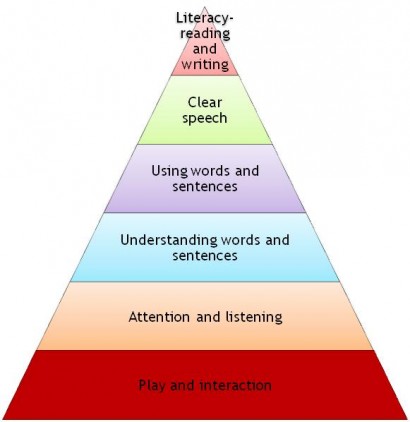Play and Interaction
- Does your child find it hard to play with others?
- Do they look at you when you are talking to them?
- Do they like playing with one particular toy or do they play with toys in an unusual way?
- Can you have a conversation with your older child about different topics or do they always want to talk about the same thing?
Your child may need support with their play and interaction skills. Therapists often start by developing and reinforcing these skills before moving onto other areas of language development. It may look like we are “only” playing with your child but we are helping them build an important building block for communication. This is the largest section of our Pyramid of Language Development
Interaction is vital for successful communication. It happens when two people share an interest in something and make a connection. This can be through starting a conversation, asking for something or responding to something someone has said. Children learn and develop their interaction skills through play. They learn to play with other children and take turns. They invite others to play with them, make up stories together and keep games going.
How can you help?
-if you are worried about your child’s interaction get in touch
-watch your child as they play, look and learn about what they are interested in, will they let you join in?
-turn off the TV, lock away the tablet and get some toys out!
– play “people games”- e.g. tickling, chasing, row row row your boat. These games don’t need any toys so are great for showing children that other people can be fun to play with too.
Difficulties with interaction can be a sign that your child has more complex communication needs such as Autism, language impairment or learning difficulties. Don’t sit at home and worry about it, get in touch with us or your GP, there’s lots we can do to help.
Beth Atkinson
Chatter Independent Speech Therapy

